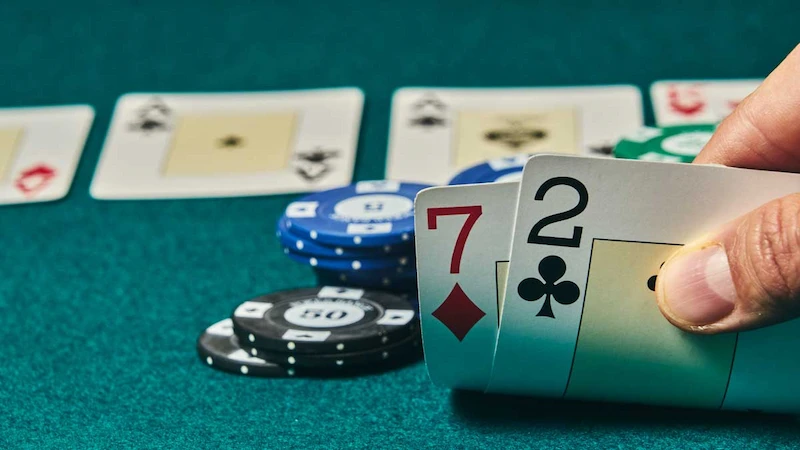Are you aspiring to become a professional poker player and immerse yourself in the world of strategic play and big wins? The path to success in poker requires hard work, dedication, and love for the casino game. We’ve compiled an in-depth guide that outlines ten important steps to help you turn your poker hobby into a lucrative career.
1. Immerse yourself in the game

To become poker player well, you must first cultivate a deep understanding of the game. Start by researching different poker variations, such as Texas Hold’em, Omaha, Seven Card Stud and Razz. Each has its own strategies, challenges and opportunities. Become familiar with the terms and jargon used in the poker community to better communicate with other Poker players. Study poker books, watch professional poker streams, and join online forums to interact with experienced Poker players and pros. Listen to their advice and ask questions, as learning from others will greatly improve your understanding of the game.
2. Master the rules
Having a solid grasp of the rules for every poker variation you plan to play is essential. Thoroughly understand popular versions such as Texas Hold’em, Omaha and Seven Card Stud, as well as lesser-known alternatives such as Badugi and Triple Draw Lowball. This broad knowledge will give you a competitive edge and enable you to thrive in different environments.
Read about each game’s specific betting structure, winning hand combinations, and playing strategies. It’s essential to understand the rules and etiquette of live poker, such as appropriate behavior at the table, handling your chips, and knowing when it’s your turn to act.
3. Develop key concepts of Poker
To be a successful poker player, you need to master many important concepts. Invest time in learning about card draws, card combinations, ranges, pot odds, implied odds, reverse implied odds, fold capital, Independent Chip Model (ICM) and Expected Value (EV). These concepts will form the foundation of poker player strategy and allow you to make informed decisions at the table. Also, get acquainted with the Game Theoretic Optimization (GTO) strategy. This balanced approach to poker helps you avoid being taken advantage of by other Poker players and ensures that your play is unpredictable.
4. Commit to continuous practice

The more you practice, the better you get at poker. Online poker platforms allow you to play multiple tables at the same time, which can help you gain experience quickly. Start with two or three tables and gradually increase the number as you feel more comfortable managing multiple games. Experiment with different table sizes and different poker variations to determine your preferences and find the games that best benefit your skill set. Take detailed notes of your hands and review them regularly to identify areas that need improvement. You can also invest in poker software, such as card trackers and equity calculators, to refine your play even further.
5. Choose your hands wisely
Choosing the right hand to play is crucial for long-term success in poker. Apply a tight, aggressive strategy in Texas Hold’em, playing high-end cards aggressively when in the right position. Monitor your opponents’ playing style and adjust your strategy accordingly. For example, if your opponent is playing passively, you can become more aggressive with weaker hands. Conversely, if you face aggressive Poker players, tighten your range and wait for strong hands to take advantage of their excessive aggression. Developing a solid card selection strategy will help you avoid costly mistakes and maximize your chances of winning.
6. Master the art of deception
Bluffing is an essential skill in poker, as you don’t always have a strong hand. Learn when and how to bluff effectively, ensuring your bluffing is reliable and timely. Steal the blinds and be more aggressive pre-flop when the situation calls for it.
7. Control your emotions
Poker can be an emotional game, but it’s important to stay cool, calm and focused. Master the art of emotional control by learning to manage stress, frustration, and anxiety. Adopt a stoic attitude at the dinner table and avoid showing any emotions. Practice mindfulness and meditation techniques to improve your mental resilience, which will benefit you both on and off the poker table. Remember, failure and losing streaks are inevitable; it’s how you handle them that will set you apart from your competitors.
8. Bank management

Effective bankroll management is vital to maintaining poker success. Develop a prudent bank capital management strategy that suits your risk tolerance and skill level. Avoid playing games that are too expensive for your capital, as this can lead to emotional decision making and sub-optimal play. Set up a set buy-in limit for each game, depending on your available funds, and stick to it. Be ready to reduce your bets if you hit a losing streak or find yourself in a challenging environment. By protecting your bankroll, you’ll be in a better position to weather the natural ups and downs of poker.
9. Connect with other Poker players
Building relationships with fellow poker enthusiasts can provide valuable insights, support, and camaraderie. Join poker communities, online forums, and social media groups to interact with like-minded individuals and share your passion for the game. Attend poker events and tournaments, both domestic and international, to expand your network and learn from a variety of Poker players. Developing a strong support system can help you stay motivated, inspired, and informed as you progress in your poker career.
10. Analyze and improve
Self-analysis and continuous improvement is important for any poker player who wants to reach the professional level. Review your hand history regularly, identifying patterns, leaks, and weak areas. Seek feedback from other Poker players and participate in hand discussion forums to gain new perspectives and insights. Consider investing in poker training or coaching programs, where experienced professionals can provide tailored guidance and help you hone your skills. Continuously strive to grow and never become complacent, as poker is an ever-evolving game that requires adaptability and a commitment to learning.
Summary
By following these ten steps and dedicating yourself to the pursuit of excellence in poker, you will be well on your way to becoming a professional player. Remember that success takes time, perseverance and passion. Embrace the journey and enjoy the process of honing your skills and achieving your poker dreams at Jilievo.
